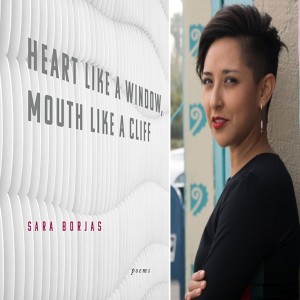
26K
Downloads
304
Episodes
The Chills at Will Podcast is a celebration of the visceral beauty of literature. This beauty will be examined through close reads of phrases and lines and passages from fiction and nonfiction that thrills the reader, so much so that he wants to read again and again to replicate that thrill. Each episode will focus on a different theme, such as "The Power of Flashback," "Understatement," "Cats in the Cradle," and "Chills at Will: Origin Story."
Episodes

Tuesday Jan 11, 2022
Tuesday Jan 11, 2022
Episode 99 Notes and Links to Sara Borjas’ Work
On Episode 99 of The Chills at Will Podcast, Pete welcomes Sara Borjas, and the two talk about, among other topics, Sara’s relationship with language, bilingualism and identity, pochismo, formative and transformative writers and teachers, and themes and ideas from Sara’s standout collection, Heart Like a Window, Mouth Like a Cliff.
SARA BORJAS is a Xicanx pocha, is from the Americas before it was stolen and its people were colonized, and is a Fresno poet. George Floyd. Delaina Ashley Yaun Gonzalez. Lorenzo Perez. Xiaojie Tan. Say their names. Joyce Echaquan. Her debut collection of poetry, Heart Like a Window, Mouth Like a Cliff was published by Noemi Press in 2019 and won a 2020 American Book Award. Juanito Falcon. Breonna Taylor. Daoyou Feng. Elcias Hernandez-Ortiz. Sara was named one of Poets & Writers 2019 Debut Poets, is a 2017 CantoMundo Fellow, and the recipient of the 2014 Blue Mesa Poetry Prize. Hyun Jung Grant. Ahmaud Arbery. Suncha Kim. Her work can be found in Ploughshares, The Rumpus, Poem-a-Day by The Academy of American Poets, Alta and The Offing, amongst others. Sandra Bland. Soon Chung Park. Yong Ae Yue. She teaches innovative undergraduates at UC Riverside, believes that all Black lives matter and will resist white supremacy until Black liberation is realized, lives in Los Angeles, and stays rooted in Fresno. Say their names. Justice for George Floyd and the countless others. She digs oldiez, outer space, aromatics, and tiny prints, is about decentering whiteness in literature, creative writing, and daily life.
Buy Sara Borjas' Heart Like a Window, Mouth Like a Cliff
From The Rumpus:"A CLEANSING TORNADO: HEART LIKE A WINDOW, MOUTH LIKE A CLIFF BY SARA BORJAS"
The Georgia Review Review of Heart Like a Window, Mouth Like a Cliff
“Pocha and Proud: An Interview with Sara Borjas” from Los Angeles Review of Books
At about 2:30, Sara talks about her relationship with language growing up, particularly her relationship with Spanish and bilingualism
At about 6:00, Sara explains the “pocho lecture” and how speaking Spanish was punished in her parents’ lives
At about 9:10, Pete asks Sara what she was reading as a kid, and if she “saw herself” in what she read
At about 11:10, Sara talks about her first exposure to writers of color, guided by Professors Alex Espinoza and Sameeta Najmee, and reading greats like Helena Maria Viramontes and Marisela Norte
At about 12:15, Pete and Sara talk about their shared admiration for Marisela Norte and Sara's work connecting to that of Moffat Takadiwa
At about 13:00, Sara talks about Tomás Rivera and his background and connections to UIC Riverside where she teaches
At about 14:00, Sara muses on the void that existed in her reading that “aligned with whiteness” and how it affected her
At about 15:50, Pete and Sara discuss “pocho” and its implications; Sara talks about reclaiming its meaning
At about 20:00, Sara describes the ways in which people of color, her parents included, have been innovative in escaping prejudice and oversimplified narratives
At about 20:45, Pete asks Sara about “pocho” in work that has come in recent years, including by innovators like Alan Chazaro, Episode 92 guest
At about 23:20, Sara shouts out writers who have and continue to have an effect on her through their chill-inducing work, including Marwa Helal, Aria Aber, Layli Long Soldier, Anthony Cody, Tongo Eisen-Martin, Roque Dalton, Bob Kaufman, Alejandra Pizarnik, and some standout students of hers
At about 26:25, Pete asks Sara how she explains to her students about “language to assert power,” including how Marwa Helal flips the script
At about 28:30, Pete wonders about Sara’s thoughts on “decoding” her poetry, and poetry “having one answers”
At about 31:30, Pete asks Sara about the idea of reciting poetry from memory, and she talks about the “power” that comes from memorizing, including how she talked to Tongo Eisen-Martin about memorization
At about 33:20, Sara describes how she grew into becoming a poet, including some incredible mentorship and encouragement from Juan Luis Guzmán, and transitions into ways in which she and other women have been made to feel like they need to be quiet
At about 37:30, Sara meditates on her evolving attitude towards her missions and work over the years
At about 39:10, Pete wonders how Sara seeks out and pumps up students who are like she was when she was in school
At about 41:50, Pete and Sara have a discussion about Sara’s ideas of prose and other formas, as done in Heart Like a Window, Mouth Like a Cliff; she also describes some probing and helpful questions from Carmen Gimenez Smith that led to writing ideas
At about 46:35, Sara details the inspiration she received from Anish Kapoor’s installation, and how it served as a muse for Sara’s poem “We are Too Big for This House”
At about 49:35, Pete asks Sara about poem titles and their connection to the poems themselves
At about 50:55, Sara gives her thoughts on translation in her poems
At about 52:20, Sara answers Pete’s question regarding if Sara is the narrator/protagonist of her poems
At about 53:50, Sara talks about the importance of creative expression and the power and beauty of poems, as exemplified by Michael Torres and The Minnesota Prison Writing Workshop
At about 55:20, Pete asks Sara about her collection using powerful words from Audre Lorde and Cherie Moraga as epigraphs
At about 59:00, Sara describes identity as seen in her work, including Aztlan’s significance in the collection’s first poem and in society as a whole; she describes it as a “marker” and a “tool for transformation”
At about 1:02:00, Pete recounts some brilliant and profound lines about identity from poems in the collection, including ones about women’s liberation
At about 1:04:45, Pete cites “Los de Abajo” and asks Sara about her ideas of rasquachismo and its importance in her work; she shouts out creative art as seen at Tío’s Tacos in Riverside
At about 1:06:55, Sara and Pete discuss the “mother and daughter’ relationships” as an overriding theme in her collection; Sara shouts out Rachel McKibbens as another inspiration
At about 1:10:20, Sara and Pete converse about intergenerational trauma and machismo in Sara’s work
At about 1:12:45, Pete wonders about Narcissus and the multiple appearances in Sara’s work; she mentions inspiration coming from a class taken with Reza Aslan
At about 1:16:10, Sara talks about conceptions of gender as seen in her work
At about 1:18:00, Sara gives background on “Mexican Bingo” and reads the poem
At about 1:22:30, Pete asks about Sara’s future projects, including her penchant for writing skits and music
At about 1:24:00, Sara gives out contact info and encourages people to buy her book from Noemi Press or on Bookshop
You can now subscribe to the podcast on Apple Podcasts, and leave me a five-star review. You can also ask for the podcast by name using Alexa, and find the pod on Stitcher, Spotify, and on Amazon Music. Follow me on IG, where I’m @chillsatwillpodcast, or on Twitter, where I’m @chillsatwillpo1. You can watch other episodes on YouTube-watch and subscribe to The Chills at Will Podcast Channel. Please subscribe to both my YouTube Channel and my podcast while you’re checking out this episode.
This is a passion project of mine, a DIY operation, and I’d love for your help in promoting what I’m convinced is a unique and spirited look at an often-ignored art form.
The intro song for The Chills at Will Podcast is “Wind Down” (Instrumental Version), and the other song played on this episode was “Hoops” (Instrumental)” by Matt Weidauer, and both songs are used through ArchesAudio.com.
You can now subscribe to the podcast on Apple Podcasts, and leave me a five-star review. You can also ask for the podcast by name using Alexa, and find the pod on Stitcher, Spotify, and on Amazon Music. Follow me on IG, where I’m @chillsatwillpodcast, or on Twitter, where I’m @chillsatwillpo1. You can watch other episodes on YouTube-watch and subscribe to The Chills at Will Podcast Channel. Please subscribe to both my YouTube Channel and my podcast while you’re checking out this episode.
This is a passion project of mine, a DIY operation, and I’d love for your help in promoting what I’m convinced is a unique and spirited look at an often-ignored art form.
The intro song for The Chills at Will Podcast is “Wind Down” (Instrumental Version), and the other song played on this episode was “Hoops” (Instrumental)” by Matt Weidauer, and both songs are used through ArchesAudio.com.
I’m looking forward to sharing Episode 100 (WHOA) with Susan Muaddi Darraj, teacher, writer of the groundbreaking Farrah Rocks middle-grade series, and winner of the AWP Grace Paley Prize for Short Fiction. The episode airs on January 17.

No comments yet. Be the first to say something!